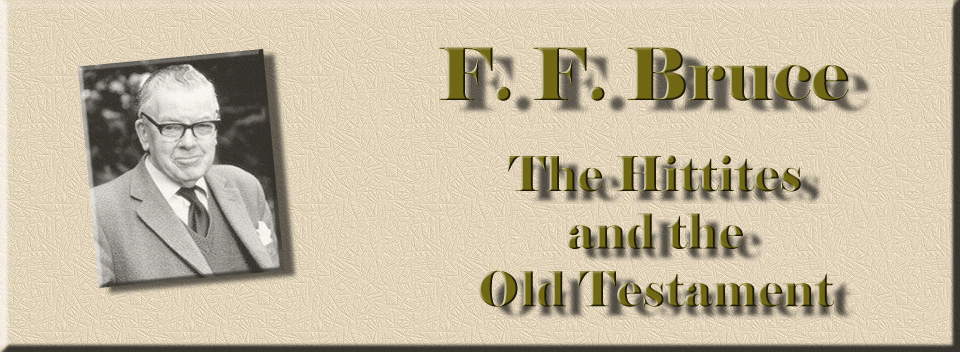
The Hittites and the Old Testament
By Frederick Fyvie Bruce
Chapter 1
I. THE BIBLICAL DATA SURVEYED
Until last century the Hittites could not have been considered at all, except in relation to the Old Testament, for they were quite unknown outside it. To-day we have learned so much about them from other sources, especially from their own records, that in the light of this wealth of knowledge we can turn back to the Old Testament and read what it has to say about the Hittites with fresh understanding.The Table of Nations in Gen. x. presents Heth, the eponymous ancestor of the Hittites, as a son of Canaan: “Canaan begat Zidon his firstborn, and Heth” (verse 15; cf. 1 Chr. i. 13). Thereafter the Hittites, or children of Heth, regularly appear as one of the medley of races making up the population of Canaan, alongside the Canaanites, Amorites, Hivites, Jebusites, and so on. Abraham, in Gen. xxiii. 3 ff., buys from the sons of Heth a piece of ground at Hebron as a burying-place for Sarah. Esau, in Gen. xxvi. 34, marries two wives of the daughters of Heth. The report of the spies in Num. xiii. 29 locates the Hittites in the hill country of Canaan, along with the Jebusites and Amorites.
But Joshua i. 4 seems to give them a farther-flung domain: the Israelites are promised the territory “from the wilderness and this Lebanon even unto the great river, the river Euphrates, all the land of the Hittites”. The phrase “the land of the Hittites” appears again in Judges i. 26, where a native of Luz (Bethel), whose life was spared when the Israelites took that city, is said to have gone “into the land of the Hittites” and built another city of Luz there. King David’s empire, according to the restored text of 2 Sam. xxiv. 6, marched on the north with “the land of the Hittites towards Kadesh” (i.e. Kadesh on the Orontes); and two Hittites appear in his entourage, although they have Semitic names: Ahimelech the Hittite (1 Sam. xxvi. 6) and Uriah the Hittite, one of David’s mighty men and first husband of Solomon’s mother Bath-sheba (2 Sam. xi. 3, etc.). Solomon acted as a middleman between Cilicia1 and Egypt in the horse and chariot trade “for all the kings of the Hittites, and for the kings of Syria” (1 Kings x. 28f.), and Hittite women were included in his well-stocked harem (1 Kings xi. 1). When the Syrian army raised the siege of Samaria in the reign of Jehoram, it was because of a rumour that Jehoram had enlisted against them the aid of “the kings of the Hittites and the kings of the Egyptians” (2 Kings vii. 6). And last in order of writing, but referring to a point of time at least as early as Abraham’s date, we have Ezekiel’s repeated reminder to the city of Jerusalem that the Amorite was her father, while her mother was a Hittite (Ezek. xvi. 3, 45).
From these references it is clear that the Hittites are presented in the Bible in two ways: first, as one of the ingredients in the population of Canaan, and secondly, as inhabitants of a territory to the north of Palestine whose kings are worthy to be mentioned alongside the kings of Syria and Egypt.
1 In I Kings x. 28 read with LXX and Vulg. miq-Qo|wah (“from Kué [Cilicia]”) twice instead of MT miqwe|h (“drove”). So, too, in 2 Sam. xxiv. 6, referred to above, read with LXX ereş ha-Hittī|m Qa|dhe|sha|h for MT ereş Tahtī|m-hodhshþ.
To display the Greek & Hebrew words in this article you will need the BibleWorks Greek and Hebrew fonts for Windows
Original files can be downloaded from http://www.biblicalstudies.org.uk/
-
Site Navigation
 Home
Home What's New
What's New Bible
Bible Photos
Photos Hiking
Hiking E-Books
E-Books Genealogy
Genealogy Profile
Free Plug-ins You May Need
Profile
Free Plug-ins You May Need
 Get Java
Get Java.png) Get Flash
Get Flash Get 7-Zip
Get 7-Zip Get Acrobat Reader
Get Acrobat Reader Get TheWORD
Get TheWORD